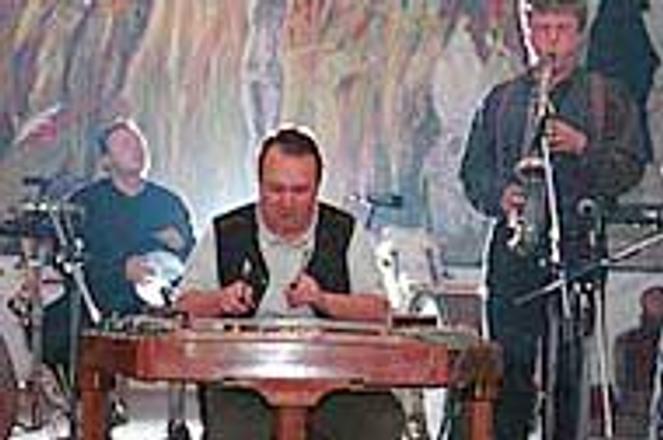GHYMES mixes traditional Hungarian music with modern influences...photo: Courtesy of Ghymes
"NO OTHER language irritates Slovaks like Hungarian," says Tamás Szarka, 37, the vocalist and violinist of the Ghymes band (pronounced gee-mesh) from the southern Slovak town of Galanta.
Szarka should know - Ghymes' music has Hungarian lyrics, and has met little popularity among the ethnic Slovak majority.
The reason, he says, is history. Slovaks lived under Hungarian domination for almost a millennium, during which time use of the Hungarian language was enforced and Slovak independence efforts were quashed. The wounds of history says Szarka, have taken a long time to heal, and still breed dislike for the Hungarian language among Slovaks.
"Language is one of the reasons we aren't played on radio or TV, why we aren't invited to play concerts in our homeland," Szarka says. "Another reason is our music, which is in the world music style which hasn't yet broken onto the Slovak music scene."
Fans of world music have a rare opportunity to see Ghymes live in Slovakia on April 25 at 18:00 at Bratislava's largest shopping centre, Aupark on the Petržalka side of the river.
While Ghymes won Hungary's Golden Giraffe last year (a top Hungarian music award), the band is almost invisible in Slovakia, its home. Ghymes plays about a dozen concerts in Slovakia every year, but plays about 50 times in Hungary and 20 to 30 times elsewhere abroad.
...often changing instruments.photo: Courtesy of Ghymes
Miloš Janoušek, a music writer and critic, argues that Ghymes' complicated music style is the main issue, although he admits that bands singing in Slovak have a better chance of getting established on the local scene.
"The music Ghymes plays is not simple, it's a minority genre which has not gained as much popularity in Slovakia as it has in the Czech Republic or Hungary. Consequently, the band is enclosed in a vicious circle, resulting in no promotion, no interest by publishers or organisers."
Named after an ethnic Hungarian village near the western Slovak town of Nitra, Ghymes was formed in 1984. Initially performing authentic Hungarian folk music, a driving, rhythmic form with roots in the Transylvania region of Romania, the band's musical repertoire gradually expanded. Ghymes started to compose their own works inspired by traditional music from central Europe and the Middle East, enriched by different music styles the founding members brought to the band.
"We all came from different music genres," says Szarka. "I played classical music, my brother Gyula practised old music and Andor Buják played rock and roll."
Over the 18 years the band has existed, jazz and rock instruments such as the saxophone, drums and trumpet started to appear alongside the traditional violin, dulcimer, contrabass, koboz and lyre, giving the band a unique sound. Dynamic, up-tempo rhythms with strong drum beats alternate with aggressive dance melodies and slow string instrumentals.
"Ghymes' music breathes tenderness and romance as well as howling surges of energy. It's a special mix of influences. It's something that defies any precise musical label. That's why the world music spectrum is so interesting." says Janoušek.
SZARKA on the vocals and contrabass.photo: Courtesy of Ghymes
"I'm sure that if Stravinsky had composed his Rites of Spring today, he would have done it similar to Ghymes on their Rege [Fable] album."
The band consists of four musicians, each of whom plays at least two instruments. Ghymes usually plays as a quintet or sextet, however, joined by a drummer, female-vocalist and synthesiser player. The band's last CD (its seventh), Emerald City issued in 2000, will soon be followed by a new one.
"We plan to issue a new CD in the fall, where we are thinking of singing in Slovak and English as well," says Szarka.
Ghymes remains fatalistic about its poor record in Slovakia, saying that the world market may prove to have fewer deep cultural barriers.
"I think our music is too good not to break through," says Szarka. "But I won't feel bad if we don't make it big in Slovakia. I simply don't expect it, because the Hungarian language is the only one that irritates Slovaks. Still, I feel at home here, and my true home is Galanta. For me, Žilina [a bastion of Slovak nationalism] is not my home. But we put our whole hearts into playing our music for whomever."
"The path Ghymes has chosen to walk is a thorny one in our country," adds Janoušek. "However, the reactions of locals who have had the chance to hear them playing are very positive."
What: Ghymes - live concert.
Where: Aupark, shopping mall on the Petržalka side of the Danube river, Einsteinova street, Bratislava.
When: April 25 at 18:00
Admission: free.
For more information on the band go to www.ghymes.sk or www.ghymes.hu


